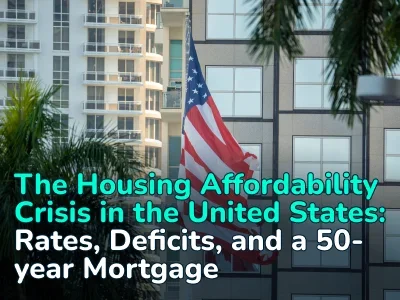
U.S. interest rates are at their peak right now. What do buyers and sellers need to consider?
Mortgage rates in the US have reached the highest level in 23 years. Such data is given by Freddie Mac.
The average interest rate on a 30-year fixed-rate mortgage rose to 7.31% from 7.19% last week. That's the highest level since December 2000. The average interest rate on a 15-year fixed-interest mortgage was 6.72%, up from 6.54% last week.
First and foremost, rising mortgage rates in the U.S. are affected by inflation, which is at a 40-year high. As a result, it is becoming more expensive for banks to borrow money, which leads to an increase in the cost of mortgage loans.
The next factor is bond yields, which have also been rising in recent weeks. This is because investors are demanding higher yields in order to lend money to the government.
Despite rising rates, demand for housing remains strong. This is putting pressure on home prices—in August 2023, the average transaction amount reached $420.3k.
What does this mean if you are a home buyer?
If you're thinking about buying a home, it's important to be prepared for rising mortgage rates. When budgeting your down payment and monthly mortgage payments, you should also take into account rising home values.
If you have already been pre-approved for a mortgage loan, you should discuss your options with your lender. You may be able to lock in a lower rate for a certain period of time, or you may want to consider a shorter-term mortgage loan.
What does this mean if you are a real estate seller?
If you are selling your home, you should be prepared for the fact that the time to sell may increase and the number of offers may decrease. You may also want to consider making concessions to buyers, such as paying closing costs or helping them get pre-approved for a mortgage.
Author
I am responsible for editorial work. I write expert interviews and guides.























